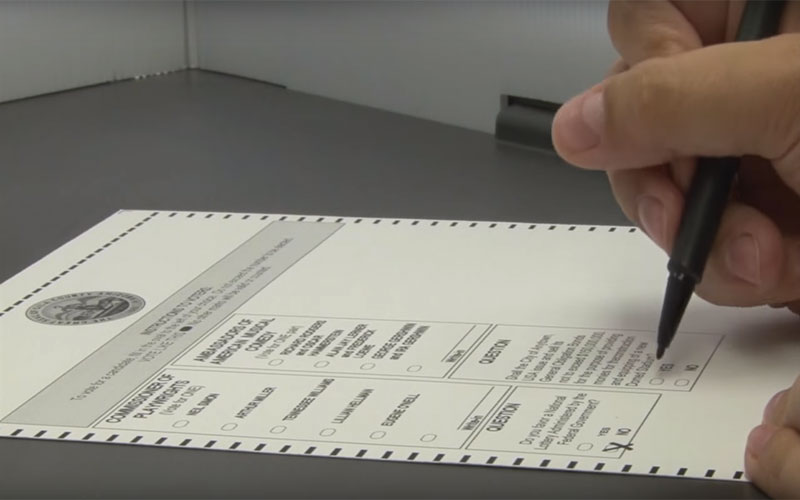
A federal court again upheld Arizona’s 2016 law that limits “ballot harvesting” by making it a felony for anyone besides family members, caregivers or postal workers to turn in another person’s early ballot – a defense against ballot tampering to supporters, a solution to an “imaginary problem” to critics. (Photo by Erin Johnson/Cronkite News)
WASHINGTON – Yet another legal challenge to Arizona’s “ballot harvesting” law was shot down in federal court Wednesday when a panel of the 9th U.S. Circuit Court of Appeals refused to overturn the law known as HB 2023.
Arizona Democratic Party activist Rivko Knox challenged the law on grounds that it was pre-empted by federal law and that it violated her First and Fifth Amendment rights. An attorney for Knox said she was was “incredibly disappointed” in the ruling that upheld what one voting rights activist dubbed the “you can’t help your elderly and disabled neighbor vote law.”
HB 2023 makes it a felony for anyone other than a family member, caretaker or postal worker to collect another person’s ballot and turn it in to election officials. Supporters of the measure defend it as a safeguard against potential ballot tampering.
Knox, a Democratic Party precinct committeewoman for Acacia since 2004, said that part of her job is to go door-to-door to encourage people to register and vote, which often includes telling them to keep an eye out for their early ballots to arrive in the mail.
In 2016, she said in court filings, she collected and delivered a ballot at the request of at least one voter whom she had visited, but that she stopped doing that after the passage of HB 2023.
Knox wanted to resume collecting ballots for 2018 elections and went to court to block HB 2023 while she pressed her challenge to the validity of the law.
But a district court rejected her injunction request and her claims, a rejection that was upheld Wednesday by a three-judge panel of the appellate court.
The panel rejected all three of Knox’s claims, according to a summary of the ruling, that said federal law did not pre-empt state law, because state limits on early voting by mail are not “an area where there has been a history of significant federal presence.”
The court also denied Knox’s claim that the law affects her First Amendment right to free speech. She said ballot harvesting helped her spread the message that “voting is the most fundamental right in a democratic society and that (she is) committed to helping qualified electors exercise their right to vote,” and that HB 2023 restricted that right.
Finally the court denied her Fifth Amendment claim that HB 2023 “is an overly vague criminal statute” and as a result could lead to “arbitrary enforcement.”
The court flatly rejected Knox’s claim that the law’s exemption for ballot harvesting by “any other person who is allowed by law to transmit United States mail . . . if . . . engaged in official duties” is so vague that it could apply to a precinct official like herself.
“We disagree,” wrote Judge Sandra Ikuta for the panel. “No person of ordinary intelligence would conclude that a precinct committeeperson is an election official who is authorized to collect early ballots as part of her official duties.”
The decision was criticized by Alex Gulotta, Arizona state director of the group All Voting is Local, who said the law set out to solve an “imaginary problem” and that it has disproportionately affected minority and low-income communities.
“Rural areas on the Navajo Nation or other places, there isn’t reliable or good mail service, in many circumstances people don’t have solid addresses,” Gulotta said.
“If there’s a way that the community can organize to collect those ballots and bring them and get them mailed that’s a community service,” he said. “It’s not something we want to prevent it’s something we want to support.”
The circuit court decision comes almost two months after a similar lawsuit, filed by the Arizona Democratic Party, failed to stop the law. Knox’s attorney, Roopali Desai, said the question of how to tackle the law in the future is a political rather than legal question.
“One answer to the passage of these laws at the Legislature in Arizona and elsewhere that suppress voters is to elect different people, and to actually elect people who do value the franchise,” Desai said.
Attorney General Mark Brnovich’s office, which defended the law in court, did not immediately respond to request for comment on the ruling.
